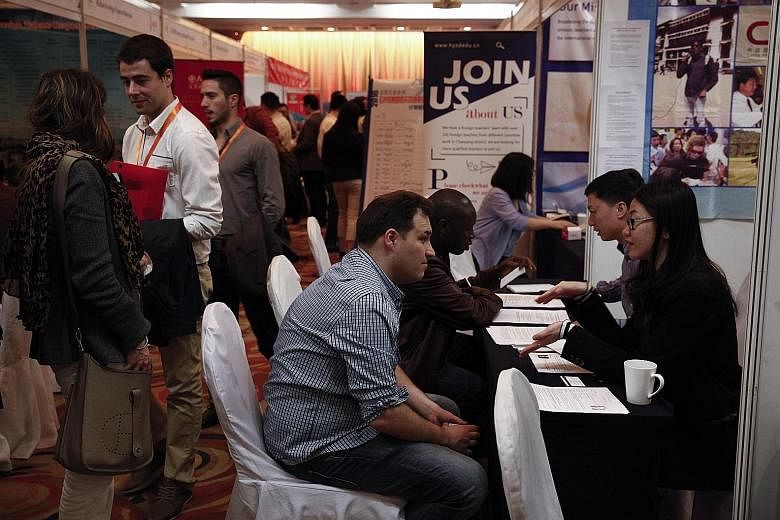BEIJING • If you have ever wondered what class of person you are, move to China and find out.
Starting on Nov 1, the Chinese government will begin sorting foreigners into three categories: A, B and C.
It is part of a new nationwide work permit system that aims to build an innovation-driven economy by "encouraging the top, controlling the middle and limiting the bottom" of foreigners in China, state news media reported.
-
Three classes of foreign workers
-
According to the China Organisation Personnel Newspaper, a publication under the Ministry of Human Resources and Social Services, points will be assigned to jobs according to salary, education level, Chinese- language skills and age, among other things.
• Class A will include top professional, innovative and creative talent. At least 85 points are needed to qualify as an A.
• Class B will include other professionals who fit China's economic development plans and could fill short-term gaps, especially in management and technical areas, said the newspaper. There will be limits in international trade, sports, culture and education. At least 60 points are needed to qualify as a B.
• Class C will include unskilled or service industry workers, and these should be "strictly limited", the paper said. Fewer than 60 points are needed to qualify as a C.
-
NYTIMES
"It aims to better serve overseas talent coming to work in China," said Mr Zhang Jianguo, leader of the State Administration of Foreign Experts, which will run the system that is to go nationwide on April 1 after being tested in nine cities and provinces, including Beijing and Shanghai.
Under the current system, there are two types of work permit: An employment licence for foreign employees issued by the Ministry of Human Resources and Social Security, and a foreign expert work permit issued by the State Administration of Foreign Experts Affairs.
"Legally, it is pretty hard to tell which category an applicant belongs to," Professor Liu Guofu, an expert on immigration law at the Beijing Institute of Technology, told the China Daily newspaper.
"For example, if a foreign specialist from Microsoft applies for a work permit in China, is he an expert or not?" Prof Liu said, adding that the current system can be confusing for foreigners.
The new unified work permit will classify applicants into categories A, B and C.
The planned change is creating a buzz among foreigners working in China, who are keen to know how the government will classify them.
According to the most recent official figures, from the 2010 census, about 200,000 foreigners worked legally in China and an additional 400,000 were dependants.
The number seems low. In an e-mail interview, Mr Eric Liu, a consultant at Foreign HR, a human resources company based in Beijing, estimated that there were two million last year, with up to 300,000 more working illegally, mostly on tourist visas.
China needs many more foreign workers, but it is often hard for them to get visas, he said.
"Companies of every type need foreign workers for economic development, whether big state-owned enterprises or private companies," he said.
The prospect of being classified is disconcerting to some.
James, a former high school instructor in Wyoming who now teaches at a kindergarten in Beijing, wondered how teachers would be defined. He asked to be identified only by his first name to avoid drawing negative attention from his employer.
"They haven't released how the scoring system is going to work," he said. "That is a worry to me. I would like to know how I can become an asset to China and exactly where I stand."
Teachers would probably be classified as Bs, said Mr Liu, who has studied the sparse information available on the scheme.
James agreed. "Initially, I had a very negative reaction to being Class B," he said. He likened the feeling to "now I am just a Class B foreign worker".
Still, the new system, which will be computerised and linked with a photo ID and number for each worker - the old system was mostly paper-based - could bring benefits.
"If it is going to create more transparency and accountability, I think it is going to be a good thing," James said.
An official reached by telephone at the State Administration of Foreign Experts information section said that the details were still being worked out and would be released in a staggered fashion as the policy evolved.
NYTIMES, CHINA DAILY/ASIA NEWS NETWORK

